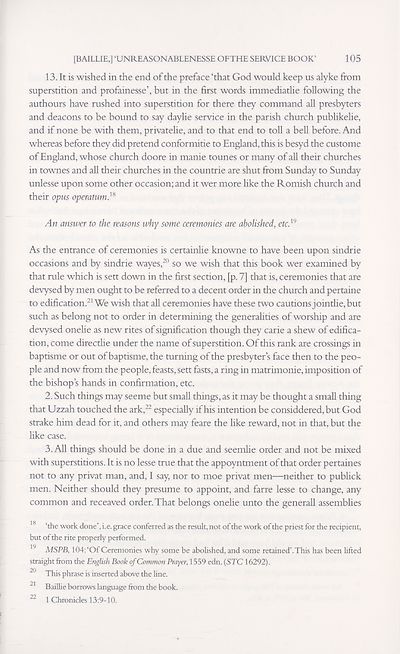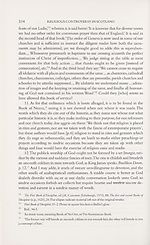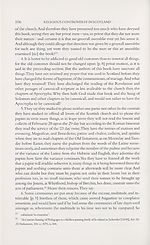Series 5 > Religious Controversy in Scotland 1625-1639
(120) Page 105
Download files
Complete book:
Individual page:
Thumbnail gallery: Grid view | List view

[BAILLIE,] ‘UNREASONABLENESSE OFTHE SERVICE BOOK’
105
13. It is wished in the end of the preface ‘that God would keep us alyke from
superstition and profainesse’, but in the first words immediathe following the
authours have rushed into superstition for there they command all presbyters
and deacons to be bound to say daylie service in the parish church publikelie,
and if none be with them, privatelie, and to that end to toll a bell before. And
whereas before they did pretend conformitie to England, this is besyd the custome
of England, whose church doore in manie tounes or many of all their churches
in townes and all their churches in the countrie are shut from Sunday to Sunday
unlesse upon some other occasion; and it wer more like the Romish church and
their opus operatum.'H
An answer to the reasons why some ceremonies are abolished, etc.19
As the entrance of ceremonies is certainlie knowne to have been upon sindrie
occasions and by sindrie wayes,20 so we wish that this book wer examined by
that rule which is sett down in the first section, [p. 7] that is, ceremonies that are
devysed by men ought to be referred to a decent order in the church and pertaine
to edification.21 We wish that all ceremonies have these two cautions jointHe, but
such as belong not to order in determining the generahties of worship and are
devysed onelie as new rites of signification though they carie a shew of edifica¬
tion, come directfie under the name of superstition. Of this rank are crossings in
baptisme or out of baptisme, the turning of the presbyter s face then to the peo¬
ple and now from the people, feasts, sett fasts, a ring in matrimonie, imposition of
the bishop’s hands in confirmation, etc.
2. Such things may seeme but small things, as it may be thought a small thing
that Uzzah touched the ark,22 especially if his intention be considdered,but God
strake him dead for it, and others may feare the like reward, not in that, but the
like case.
3. All things should be done in a due and seemlie order and not be mixed
with superstitions. It is no lesse true that the appoyntment of that order pertaines
not to any privat man, and, I say, nor to moe privat men—neither to publick
men. Neither should they presume to appoint, and farre lesse to change, any
common and receaved order. That belongs onelie unto the generall assembHes
18 ‘the work done’, i.e. grace conferred as the result, not of the work of the priest for the recipient,
but of the rite properly performed.
19 MSPB, 104:‘Of Ceremonies why some be abolished, and some retained’.This has been lifted
straight from the English Book of Common Prayer, 1559 edn. (STC16292).
20 This phrase is inserted above the line.
21 Baillie borrows language from the book.
22 1 Chronicles 13:9-10.
105
13. It is wished in the end of the preface ‘that God would keep us alyke from
superstition and profainesse’, but in the first words immediathe following the
authours have rushed into superstition for there they command all presbyters
and deacons to be bound to say daylie service in the parish church publikelie,
and if none be with them, privatelie, and to that end to toll a bell before. And
whereas before they did pretend conformitie to England, this is besyd the custome
of England, whose church doore in manie tounes or many of all their churches
in townes and all their churches in the countrie are shut from Sunday to Sunday
unlesse upon some other occasion; and it wer more like the Romish church and
their opus operatum.'H
An answer to the reasons why some ceremonies are abolished, etc.19
As the entrance of ceremonies is certainlie knowne to have been upon sindrie
occasions and by sindrie wayes,20 so we wish that this book wer examined by
that rule which is sett down in the first section, [p. 7] that is, ceremonies that are
devysed by men ought to be referred to a decent order in the church and pertaine
to edification.21 We wish that all ceremonies have these two cautions jointHe, but
such as belong not to order in determining the generahties of worship and are
devysed onelie as new rites of signification though they carie a shew of edifica¬
tion, come directfie under the name of superstition. Of this rank are crossings in
baptisme or out of baptisme, the turning of the presbyter s face then to the peo¬
ple and now from the people, feasts, sett fasts, a ring in matrimonie, imposition of
the bishop’s hands in confirmation, etc.
2. Such things may seeme but small things, as it may be thought a small thing
that Uzzah touched the ark,22 especially if his intention be considdered,but God
strake him dead for it, and others may feare the like reward, not in that, but the
like case.
3. All things should be done in a due and seemlie order and not be mixed
with superstitions. It is no lesse true that the appoyntment of that order pertaines
not to any privat man, and, I say, nor to moe privat men—neither to publick
men. Neither should they presume to appoint, and farre lesse to change, any
common and receaved order. That belongs onelie unto the generall assembHes
18 ‘the work done’, i.e. grace conferred as the result, not of the work of the priest for the recipient,
but of the rite properly performed.
19 MSPB, 104:‘Of Ceremonies why some be abolished, and some retained’.This has been lifted
straight from the English Book of Common Prayer, 1559 edn. (STC16292).
20 This phrase is inserted above the line.
21 Baillie borrows language from the book.
22 1 Chronicles 13:9-10.
Set display mode to:
![]() Universal Viewer |
Universal Viewer | ![]() Mirador |
Large image | Transcription
Mirador |
Large image | Transcription
Images and transcriptions on this page, including medium image downloads, may be used under the Creative Commons Attribution 4.0 International Licence unless otherwise stated. ![]()
| Scottish History Society volumes > Series 5 > Religious Controversy in Scotland 1625-1639 > (120) Page 105 |
|---|
| Permanent URL | https://digital.nls.uk/127329405 |
|---|
| Description | Over 180 volumes, published by the Scottish History Society, containing original sources on Scotland's history and people. With a wide range of subjects, the books collectively cover all periods from the 12th to 20th centuries, and reflect changing trends in Scottish history. Sources are accompanied by scholarly interpretation, references and bibliographies. Volumes are usually published annually, and more digitised volumes will be added as they become available. |
|---|


